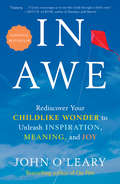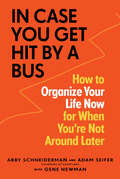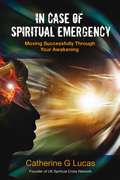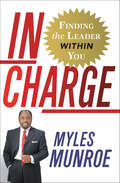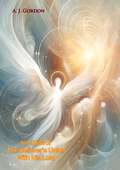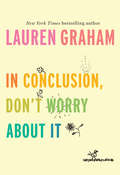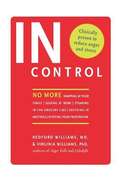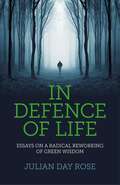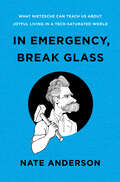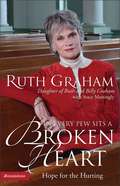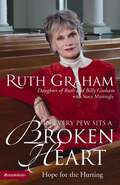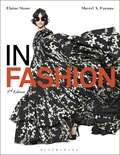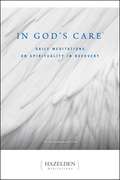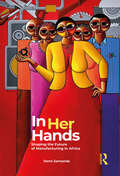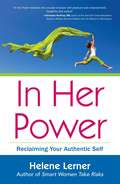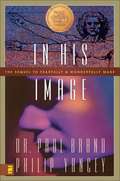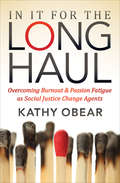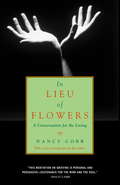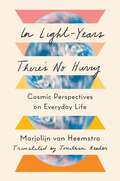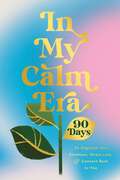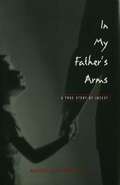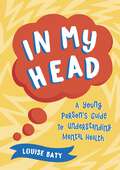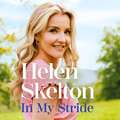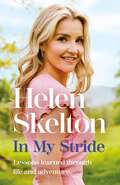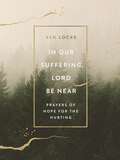- Table View
- List View
In Awe: Rediscover Your Childlike Wonder to Unleash Inspiration, Meaning, and Joy
by John O'LearyThe #1 bestselling author of On Fire shows us how to recapture and harness our childlike sense of wonder in order to become more engaged, successful, and fulfilled.&“Engaging . . . O&’Leary encourages us to see the world through a child&’s eyes.&”—Mitch Albom, author of Tuesdays with Morrie There once was a time when we joyfully raised our hands to answer questions, connected easily with others, believed that anything was possible, and fearlessly jumped into new experiences. A time when we viewed each day not as something to endure, but as a marvelous gift to explore and savor—when we danced through our lives in awe of the ordinary moments and eager for the promise of tomorrow. Unfortunately, that&’s far from our experience today. Instead, we feel disconnected and jaded. Social media reminds us that we don&’t measure up, and the mainstream media barrages us with constant negativity. Many of us find ourselves caught in a life of dogged responsibility and mind-numbing repetition. The daily struggle to earn a living has caused us to lose the sense of wonder with which we once greeted every day. In his new book, bestselling author John O&’Leary invites us to consider that it is possible to once again navigate the world as a child does. Identifying five senses children innately possess and that we&’ve lost touch with as we age, O&’Leary shares emotional, humorous, and inspirational stories intertwined with fascinating new research showing how each of us can reclaim our childlike joy, and why doing so will change how we interact with the world. In Awe reveals how we can regain that ability to see fresh insights, reach for new solutions, and live our best lives.
In Case You Get Hit by a Bus: How to Organize Your Life Now for When You're Not Around Later
by Gene Newman Abby Schneiderman Adam SeiferA step-by-step program for getting your life in order, so you&’re prepared for the unexpected. The odds of getting hit by a bus are 495,000 to 1. But the odds that you&’re going to die some day? Exactly. Even the most disorganized among us can take control of our on- and off-line details so our loved ones won&’t have to scramble later. The experts at Everplans, a leading company in digital life planning, make it possible in this essential and easy-to-follow book. Breaking the task down into three levels, from the most urgent (like granting access to passwords), to the technical (creating a manual for the systems in your home), to the nostalgic (assembling a living memory), this clear, step-by-step program not only removes the anxiety and stress from getting your life in order, it&’s actually liberating. And deeply satisfying, knowing that you&’re leaving the best parting gift imaginable. When you finish this book, you will have:A system for managing all your passwords and secret codesOrganized your money and assets, bills and debtsA complete understanding of all the medical directives and legal documents you need––including Wills, Powers of Attorney, and TrustsA plan for meaningful photos, recipes, and family heirloomsRecords of your personal history, interests, beliefs, and life lessonsAn instruction manual for your home and vehiclesYour funeral planned and obituary written (if you&’re up for it)
In Case of Spiritual Emergency
by Catherine G. LucasPersonal stories of spiritual crises are presented alongside practical and effective guidance in this exploration of a fascinating phenomenon. When spiritual emergencies, such as mystical psychosis and dark nights of the soul, are understood, managed, and integrated, they can offer enormous potential for growth and fulfillment, and this book offers three key phases for successful navigation. Encouraging, supportive, and life-saving, this resource is essential for avoiding the mental, emotional, or spiritual paralysis or exhaustion that can result from underestimating the current age of increased individual and global emergencies.
In Charge: Finding the Leader Within You
by Myles MunroeInternational motivational speaker and sought-after business consultant Reverend Myles Munroe proves that true leaders empower others to discover their own leadership gifts.
In Christ or The Believer's Union With His Lord
by A. J. Gordon"In Christ or The Believer's Union With His Lord" by A. J. Gordon is a profound exploration of the spiritual concept of union with Christ, a cornerstone of Christian theology. In this timeless work, A. J. Gordon, a renowned 19th-century pastor and theologian, delves deeply into the mystical and transformative relationship between the believer and Jesus Christ.Gordon's insightful and eloquent writing elucidates the doctrine of being "in Christ," a central theme in the New Testament. He explains how this union is not merely a theological idea but a living, dynamic reality that profoundly impacts every aspect of a believer's life. Through a careful examination of Scripture, Gordon illustrates how this spiritual union provides believers with access to Christ's righteousness, strength, and peace.The book is structured around key biblical passages and themes, offering readers a comprehensive understanding of what it means to live a life intimately connected with Jesus. Gordon discusses the implications of this union for personal sanctification, spiritual growth, and daily Christian living. His reflections are both theologically rich and practically applicable, making complex concepts accessible to readers at all levels of spiritual maturity.This classic work remains a valuable resource for anyone seeking to deepen their understanding of their relationship with Christ. "In Christ or The Believer's Union With His Lord" is essential reading for theologians, pastors, and laypeople alike, offering timeless wisdom and inspiration for living a Christ-centered life.A. J. Gordon's insightful exploration of this profound spiritual truth continues to resonate with readers, inviting them to experience the transformative power of being truly "in Christ."
In Conclusion, Don't Worry About It
by Lauren GrahamAdvice for graduates and reflections on staying true to yourself from the beloved Gilmore Girls actress and New York Times bestselling author of the memoir Talking as Fast as I Can and the novel Someday, Someday, Maybe. “If you’re kicking yourself for not having accomplished all you should have by now, don’t worry about it. Even without any ‘big’ accomplishments yet to your name, you are enough.” In this expansion of the 2017 commencement speech she gave at her hometown Langley High, Lauren Graham, the beloved star of Gilmore Girls and Parenthood, reflects on growing up, pursuing your dreams, and living in the here and now. “Whatever path you choose, whatever career you decide to go after, the important thing is that you keep finding joy in what you’re doing, especially when the joy isn’t finding you.” In her hilarious, relatable voice, Graham reminds us to be curious and compassionate, no matter where life takes us or what we’ve yet to achieve. Grounded and inspiring—and illustrated throughout with drawings by Graham herself—here is a comforting road map to a happy life. “I’ve had ups and downs. I’ve had successes and senior slumps. I’ve been the girl who has the lead, and the one who wished she had the bigger part. The truth? They don’t feel that different from each other.”
In Control: No More Snapping at Your Family, Sulking at Work, Steaming in the Grocery Line, Seething in Meetings, Stuffing Your Frustration
by Redford Williams Virginia WilliamsClinically proven to reduce anger and stress, this book's easy-to-follow program will enable you to handle anything that today's dangerously out-of-control world throws at you.
In Defence of Life: Essays on a Radical Reworking of Green Wisdom
by Julian RoseJulian Rose presents a penetrating series of essays calling for urgent action to overcome the perilous state of our planet, at the local as well as global level. He both guides and challenges his readers to share with him a journey through the matrix-maze, and to come out at the other end a more aware and more self-assured human being. Drawing upon his life experiences as a farmer, campaigner, artist and social entrepreneur, Julian brings to our consciousness a way to break through the destructive patterns of our consumer-obsessed society and discover a simpler and more fulfilling way forward. Using essays exploring a wide range of pressing planetary concerns, he calls upon his readers to utilise the largely untapped power of their deeper instincts in coming to the aid of a severely depleted global environment and in striving for the amelioration of mankind's perilous human condition.
In Emergency, Break Glass: What Nietzsche Can Teach Us About Joyful Living in a Tech-Saturated World
by Nate AndersonAn Ars Technica Holiday Reading Title of 2021 A lively and approachable meditation on how we can transform our digital lives if we let a little Nietzsche in. Who has not found themselves scrolling endlessly on screens and wondered: Am I living or distracting myself from living? In Emergency, Break Glass adapts Friedrich Nietzsche’s passionate quest for meaning into a world overwhelmed by “content.” Written long before the advent of smartphones, Nietzsche’s aphoristic philosophy advocated a fierce mastery of attention, a strict information diet, and a powerful connection to the natural world. Drawing on Nietzsche’s work, technology journalist Nate Anderson advocates for a life of goal-oriented, creative exertion as more meaningful than the “frictionless” leisure often promised by our devices. He rejects the simplicity of contemporary prescriptions like reducing screen time in favor of looking deeply at what truly matters to us, then finding ways to make our technological tools serve this vision. With a light touch suffused by humor, Anderson uncovers the impact of this “yes-saying” philosophy on his own life—and perhaps on yours.
In Every Pew Sits a Broken Heart
by Ruth Graham Stacy MattinglyThis book deals with the troubles in Ruth Graham's life and she provides hope for those hurting.
In Every Pew Sits a Broken Heart: Hope for the Hurting
by Ruth GrahamRuth Graham - daughter of beloved evangelist Billy Graham - offers a guide for those who are hurting or those who love them. She illustrates through personal stories and Scripture how nothing can keep you from experiencing the fullness of God's grace. Run with Ruth to the arms of the God you can trust, the Father God who embraces, sustains, and redeems your brokenness.Ruth Graham has discovered through bitter personal experience that God does his great work in the ruins of our lives. As Ruth's life descended through divorce, depression, and shame; as she bore heartrending parental struggles; and as she faltered trying to make wise choices in the wake of bad ones, she discovered the unending embrace of a faithful, forgiving, and grace-filled God.This book surpasses the testimony of her fascinating story as she brings sharp new insight from the Word of God for all who fear their actions may be beyond forgiveness or their broken circumstances may keep them from being used by God ever again. Through the words of Jeremiah - the weeping prophet - Ruth reveals the God who makes wasted places come to life. You'll explore the parable of the Prodigal Son as never before as Ruth discloses her own likeness to each character:The indignant older brother, struggling to understand God&’s grace toward her husband's infidelityThe prodigal, wading through the deep shame and painful circumstances of her own actionsThe father, running to embrace her children in the midst of bulimia, drug abuse, and unplanned pregnancyRuth includes practical steps in every chapter anyone can take to offer care, support, and hope to the broken people they encounter in their lives and in the pews beside them every Sunday.
In Fashion
by Elaine Stone Sheryl A. FarnanThis book offers a concise and colorful overview of the key components of fashion-from its history, movements, and trends-to the materials, producers, and retailers that impact the business on a global level. Fashion students will gain a foundation and language for understanding how the current fashion industry works and explore an array of exciting career opportunities.
In God's Care: Daily Meditations on Spirituality in Recovery (Hazelden Meditations #1)
by Karen CaseyIn God's Care guides readers in understanding and strengthening their connection with a Higher Power, however they choose to define that presence.The books in the Hazelden Meditation Series have guided millions as they search for the wisdom and understanding they need to live one day at a time. Originally developed for people recovering from alcoholism and other addictions, these books will also appeal to anyone interested in personal and spiritual growth.In God's Care guides readers in understanding and strengthening their connection with a Higher Power, however they choose to define that presence. With the inspiration and support unique to Hazelden meditation books, In God's Care offers encouragement and guidance for "practicing the presence of God" in daily life.
In Her Hands: Shaping the Future of Manufacturing in Africa: A Woman’s Story
by Demi SamandeAfrica is seen as the next large growth economy, but with this potential comes concerns about exploitation from outside interests. Based on the real-world experiences of Demi Samande, award-winning entrepreneur, this book provides a toolkit for aspirational and savvy African entrepreneurs, as well as insights for responsible investors to seize the opportunity and to help transform the African economy for the benefit of Africa. As a practical guide, the book will inspire a new generation of entrepreneurs to tackle the challenges of doing business and the steps to creating sustainable, successful companies, both large and small. It features interviews with entrepreneurs who are already having success, as well as business executives, artists and creatives who are inspiring the transformation of African business from within and from overseas. Demi’s own story, which she draws upon to illustrate how to build a successful business from scratch, starts in a London flat and traces the development of her company in Nigeria to becoming the premier manufacturer of luxury furniture in West Africa. It also tells her story from the perspective of a female entrepreneur. The book provides a hands-on roadmap for building and sustaining a business of any size and can be used on its own or in conjunction with training, either for entrepreneurs who are already in the process of building a business or for budding entrepreneurs in the classroom.
In Her Power
by Helene LernerUnveil your inner power to achieve confidence, creativity, and intimacy in every aspect of your life--from work to relationships to sex.Helene Lerner--a leading advocate for women's advancement and empowerment--reveals the nine most common self-sabotaging behaviors that hold women back and uncovers simple secrets to unlocking true feminine power. Her approach is gentle but firm, compassionate yet disciplined, and eminently practical. Discover your unique strength through insightful exercises and uplifting stories that cultivate self-empowerment. Learn how to:* stay present in the face of any challenge;* express yourself genuinely in all aspects of your life;* recognize and appreciate your uniqueness;* be authentically seen and heard with confidence;* express your sexuality and experience true pleasure. As the traditional male power structures crumble, be part of the new feminine movement that is emerging across the globe and embrace your power.
In His Image
by Philip Yancey Paul BrandTHE VOICE OF GOD IS A HEARTBEAT AWAY In Fearfully & Wonderfully Made, Philip Yancey and Dr. Paul Brand revealed how God’s voice is encoded in the very structure of our bodies. In His Image takes up where its predecessor left off, beckoning us once again inward and onward to fresh exploration and discovery. Yancey and Brand show how accurately and intricately the human body portrays the Body of Christ. In five sections—Image, Blood, Head, Spirit, and Pain—the acclaimed surgeon and the award-winning writer unlock the remarkable, living lessons contained in our physical makeup. This Gold Medallion Award-winning book will open your eyes to the complex miracle of the human body, and the even more compelling spiritual truths that it reflects.
In It for the Long Haul: Overcoming Burnout & Passion Fatigue as Social Justice Change Agents
by Kathy ObearSometimes when you&’re helping others, you need to learn to help yourself. If you make serving others and engaging in activism a priority—whether as a volunteer or a professional—feeling exhausted and overwhelmed can come with the territory, sometimes leading to despair. When the problems and obstacles feel so big, it&’s easy to lose hope, but there is a healthier way. Are you running on empty, having to push yourself to keep going? Then this book is for you. Through engaging stories and practical tips and tools, you&’ll learn how to: Recognize the warning signs you&’re burning outTake better care of yourself AND spark real change in the worldRecommit to self-care so you can be of greater serviceNavigate the backlash and self-sabotage you&’ll inevitably faceAvoid burnout and passion fatigue while maintaining a high level of energy, passion, and persistence year after year The world needs more passionate, committed change agents who can go the distance, not flame out in an all-out sprint. Read this book to find out how to recreate your life to sustain your impact in the world over the long haul.
In Lieu of Flowers: A Conversation for the Living
by Nancy Howard CobbA thought-provoking exploration of life's most profound transition • With candor and refreshing perspective, Nancy Cobb infuses the oft-avoided subject of death with light, presenting it as a natural process to be honored rather than feared. "This meditation on grieving is personal and persuasive — sustenance for the mind and the soul." —Wally Lamb, #1 New York Times bestselling author &“An elegant book ... that lets readers know they aren&’t alone.&”—The Wall Street Journal&“Grieving is as natural as breathing, for if we have lived and loved, surely we will grieve. . . .&” Nancy Cobb meets death in the most vital of places—in the lives of everyday people—and in doing so has found a way to make the darkest of subjects more approachable, and the deaths of those she has loved—and death itself—a subject to explore rather than to avoid. Cobb's personal experiences become a point of departure for what amounts to a deeper conversation about loss. She shares moments of her own mourning and draws others into the conversation as well: among them, a bank teller who still dreams of her deceased grandmother, two small children who bury a wild bird in its final nest beneath a maple tree, and a hospice nurse who acts as an end-of-life midwife. Cobb invites us to explore death through the shared humanity of everyday people, allowing their voices to demystify the inevitable while offering solace. Whether you are mourning a loved one, caring for someone at the end of life, or seeking wisdom on this universal experience, In Lieu of Flowers is a deeply comforting companion. Its gentle candor and hard-won insights will inspire you to embrace grief fully while finding light in life's final transition.
In Light-Years There's No Hurry: Cosmic Perspectives on Everyday Life
by Marjolijn van HeemstraHow seeing Earth through the eyes of an astronaut brings new wonder and meaning to life on our planet. One stifling summer night, the poet and journalist Marjolijn van Heemstra lay awake, unable to sleep—like so many of us feeling anxious and alienated, deeply exhausted yet restless. Amid the suffocating stream of daily obligations, the clamor of notifications and increasingly dismal headlines, she longed for a way to rise above the frenzy, for a renewed sense of meaning and connection. Then she learned about the overview effect—a permanent shift in consciousness many astronauts experience when beholding Earth from outside the atmosphere—and wondered: could the perspective of outer space offer the internal space she sought? The lyrical account of van Heemstra’s yearlong quest to experience the overview effect on Earth, In Light-Years There’s No Hurry invites us to lift our gaze above eye level and discover our connections with the cosmos, our planet, and each other. We follow as van Heemstra’s cosmic awareness expands and she finds herself feeling simultaneously lighter and more grounded. Compared with the complexity of the universe, daily life on Earth begins to seem more manageable, while understanding the improbability of our collective existence gives her new patience and tenderness for her neighbors. The grand rhythms of light-years and eons become a source of restoration and relief—a comforting, necessary reminder to slow down and zoom out. Contemplating the solace a cosmic perspective offers in our chaotic, divided world, In Light-Years There’s No Hurry is a moving meditation on what it is to be human amid the vastness of the universe.
In My Calm Era: 90 Days to Organize Your Emotions, Stress Less, and Connect Back to You (The New Era of You)
by Harper CelebrateBurn out and overwhelm? OUT. Protecting your peace and finding mental and physical wellness? We're going to say that's most definitely IN.It's time to embark on a New Era of You, and In My Calm Era is the perfect place to start with a few minutes each morning. In just 90 days, you'll learn how to fight back against anxiety and overwhelm and learn to reclaim the best version of you. It's amazing how much good you can do when you prioritize your mental wellness and choose yourself to be the main character of your life.During this journey, you will:Learn to honor your emotions and listen to what your body is telling youReorient yourself to the things that really matterPractice prioritizing your mental and physical wellbeing (because you're great!) For each day, you'll find:Inspirational readings that remind you of your worth, your purpose, and your prioritiesStrategies, activities, and prompts to get you out of your head and back in your bodyMemorable mantras to act as mental wellness lifelines throughout the dayBright, beautiful design that will inspire your soul and enhance your calm So come on in, carve out a few minutes for yourself, and take a breath—knowing that every breath is a lifeline back to you. Whether you're busy at work, busy at home, stuck in a brain fog, or can't seem to disconnect from anxious thoughts, In My Calm Era is the guide you need to find your footing again and reclaim peace and calm in your life.
In My Father's Arms: A Son's Story of Sexual Abuse
by Walter A. DemillyTo the outside world, Walter de Milly’s father was a prominent businessman, a dignified Presbyterian, and a faithful husband; to Walter, he was an overwhelming, handsome monster. This paperback of In My Father’s Arms: A True Story of Incest adds a reflective preface by the author and a foreword by Richard B. Gartner, PhD, author of Beyond Betrayal: Taking Charge of Your Life after Boyhood Sexual Abuse.
In My Head: A Young Person’s Guide to Understanding Mental Health
by Louise BatyThis accessible guide for 11–15-year-olds will help young people to understand and manage their mental healthDo you ever find it hard to explain what you’re thinking and feeling? Have you often pretended to be okay when in reality you’re anxious or sad? However you’re feeling, you’re not alone – because many people find it difficult to talk about their mental health.This book will help you be kind to your mind. Whether you want to understand your thoughts and emotions a little better, or learn some handy tips to help you to de-stress, it’s filled with information on how to look after your well-being and stay feeling good.Topics covered include:An A–Z of mental-health conditionsNeurodiversity in young peopleSimple self-care methodsHealthy habits for your mind and bodyHow to track your thoughts and feelingsIn My Head will help you get to know your own mind, and give you the tools and techniques to make sure you’re feeling happy and healthy.
In My Stride: Lessons learned through life and adventure
by Helen SkeltonCountryfile presenter and Strictly star Helen Skelton, shows us how getting out in nature and putting one foot in front of the other can help us journey back to ourselves.Helen Skelton is no stranger to doing hard things, from kayaking the entire length of the Amazon to competing in a boxing match for Sports Relief. Her ability to dig deep and find the inner strength and to carry on no matter the challenge - physical, mental, or emotional - is nothing short of remarkable. Helen grew up on a farm in Cumbria and credits her deep connection with nature and family for grounding her throughout the experiences in her life. In My Stride explores the lessons Helen has learned through life and adventure, sharing how getting out in nature can help us heal, grow, and find the resilience to move through challenging times in our lives. It tells stories of finding confidence, authenticity, courage, resilience, acceptance, community, and freedom against the backdrop of life's peaks and troughs and through the power of the natural world. Helen shows us how putting one foot in front of the other - whether that's on the Strictly dance floor or in the great outdoors - can help us to journey back to ourselves.(P)2023 Headline Publishing Group Ltd
In My Stride: Lessons learned through life and adventure
by Helen SkeltonHelen Skelton is no stranger to doing hard things, from kayaking the entire length of the Amazon to competing in a boxing match for Sports Relief. Her ability to dig deep and find the inner strength and to carry on no matter the challenge - physical, mental, or emotional - is nothing short of remarkable. Helen grew up on a farm in Cumbria and credits her deep connection with nature and family for grounding her throughout the experiences in her life. In My Stride explores the lessons Helen has learned through life and adventure, sharing how getting out in nature can help us heal, grow, and find the resilience to move through challenging times in our lives. It tells stories of finding confidence, authenticity, courage, resilience, acceptance, community, and freedom against the backdrop of life's peaks and troughs and through the power of the natural world. Helen shows us how putting one foot in front of the other - whether that's on the Strictly dance floor or in the great outdoors - can help us to journey back to ourselves.
In Our Suffering, Lord Be Near: Prayers of Hope for the Hurting
by Ben LockeFind hope when your world is falling apart.Where do you turn in seasons of despair? What do you do when you don't know what to do?Hardship and adversity touch everyone--illness, grief, accidents, trauma, loneliness, relationship struggles, financial crises, sin, addiction, life stressors, and so much more can leave you feeling lost, hopeless, and isolated.You are not alone. When author Ben Locke was in his darkest valleys, he was determined to tell God exactly what he thought. He poured out his agony and anger--and was met with God's grace, love, forgiveness, and mercy. He discovered in those moments that God can handle it. All of it. And the prayers that poured out Ben's experience offer a road map for you to take your sorrows, grief, and troubles to God, knowing He will meet you in your time of suffering.In Our Suffering, Lord Be Near can be a light in the darkness if you ever:Feel like questioning, yelling at, doubting, or even denouncing GodWant to separate from the churchWonder if God is listening to your prayers and cares about your troublesDo not know what to do with your angerFear that life will be this way forever The psalm like prayers borne out of these experiences will meet you in your own moments of suffering. But they are more than prayers. They're cries for help and explosions of anger, mourning, weeping, grieving, celebrating, rejoicing, and praising. They're liturgies to heal your soul, balm for your wounds, and tender mercies for your heartache. This book will help you know that:God is with you, even if you don't feel Him or understand what is happeningGod offers you grace and mercy, no matter whatGod delivers you and gives you strength Let these words help you articulate your own sorrows, bring you to your knees, encourage you to confess your insufficiency, and express your most genuine emotions. In Our Suffering, Lord Be Near will help find hope in God when your world is falling apart. God can handle your suffering. So, tell Him.
